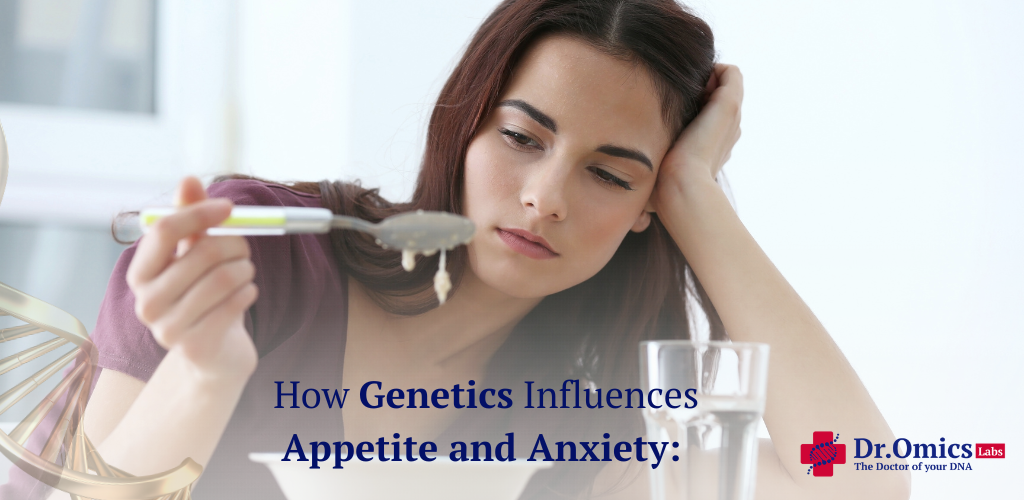The complex relationship between appetite, food intake, and anxiety is increasingly understood through the lens of behavioural genetics. As our understanding of the human genome expands, so does our ability to decode the genetic factors that influence eating behaviors and emotional responses to food. This intricate interplay between genes and environment not only governs how we perceive hunger and satisfaction but also determines our susceptibility to stress-related eating patterns. By unraveling these genetic threads, researchers are uncovering the biological foundations of our dietary habits, offering new pathways for personalized nutrition and mental health strategies. This deep dive explores the genetic underpinnings of appetite regulation, food choices, and anxiety, shedding light on how behavioral genetics shapes our relationship with food.
The Genetic Blueprint of Appetite
Appetite is regulated by a finely tuned network of hormones, neurotransmitters, and genetic factors. These elements work together to maintain energy balance and signal hunger or satiety. Certain genetic variants in genes like LEP (leptin), MC4R (melanocortin-4 receptor), and FTO (fat mass and obesity-associated gene) have been shown to significantly affect appetite regulation:
- Leptin (LEP): Leptin, a hormone secreted by adipose tissue, signals satiety to the brain. Genetic mutations in the LEP gene can lead to leptin resistance, resulting in increased hunger and food intake.(1)
- MC4R Variants: Mutations in the MC4R gene can impair signaling pathways that regulate energy balance, often linked to hyperphagia (excessive eating).(2)
- FTO Gene Polymorphisms: Variants in the FTO gene are associated with a higher preference for calorie-dense foods and reduced satiety after meals.(2)
Behavioral Genetics and Eating Behavior
Eating behavior encompasses not just appetite but also food preferences, emotional eating, and stress-related eating. Behavioral genetics uncovers how genes influence these aspects of food intake.
Key Insights:
- Dopamine and Reward Pathways: Genes like DRD2 (dopamine receptor D2) modulate the reward system, influencing cravings for high-sugar or high-fat foods.(3)
- Serotonin and Emotional Eating: Polymorphisms in the 5-HTTLPR gene, which affects serotonin transport, are linked to emotional eating and responses to stress.(4)
- Cortisol and Stress Eating: Variants in genes regulating the hypothalamic-pituitary-adrenal (HPA) axis, such as NR3C1, can influence cortisol levels, increasing susceptibility to stress-induced overeating.(5)
Appetite and Anxiety: A Genetic Interplay
The connection between anxiety and appetite is underpinned by shared neurobiological pathways, many of which have genetic determinants. Anxiety can exacerbate emotional eating, while appetite dysregulation may contribute to anxiety.
Genes Linking Appetite and Anxiety:
- BDNF (Brain-Derived Neurotrophic Factor): Variants in the BDNF gene are associated with mood regulation and appetite, linking anxiety and food intake behaviors.(6)
- GABAergic System: Mutations in GABRA2 influence the GABA neurotransmitter system, which is critical in regulating anxiety and appetite control.(7)
- COMT (Catechol-O-Methyltransferase): COMT polymorphisms affect dopamine metabolism, potentially contributing to anxiety-related changes in eating habits.(8)
Fascinating Genetic Insights into Eating Habits
- Childhood obesity is influenced by a complex interaction between genetic susceptibility and an ‘obesogenic’ environment, with rapid weight gain in the first two years being a significant risk factor for adult obesity. The Behavioral Susceptibility Theory (BST) explains this gene-environment interaction, proposing that inherited variations in appetite play a key role. According to BST, children with genetic variants promoting a strong appetite are more likely to overeat and develop obesity, while those with a genetically smaller appetite are less affected or even at risk of being underweight. Research on BST highlights its relevance in early life and suggests further exploration to understand and address childhood obesity.(9)
- This study explores the link between stress, anxiety, and starvation-like behavior using a virtual reality (VR) paradigm in mice. It reveals that stress can drive female mice, especially those with high baseline anxiety, to voluntarily seek a starvation-like state induced by AgRP neuron stimulation. Unlike males, who showed mild aversion, stressed females developed a strong preference for this state, potentially finding it anxiolytic. Facial expressions during stimulation indicated stress relief, highlighting a connection between anxiety and self-starvation behaviors. The findings offer insights into the neural mechanisms underlying conditions like anorexia nervosa and stress-induced eating disorders.(10)
Leveraging Omnigenie for Genetic Insights
Advances in genetic testing, such as Omnigenie, empower individuals to decode their genetic predispositions to appetite and anxiety. By analyzing key genetic markers, Omnigenie offers personalized insights into eating habits, enabling tailored dietary strategies for optimal health.
Practical Applications of Behavioral Genetics in Food Intake
Understanding how genetics influences appetite and anxiety can lead to actionable interventions:
For Individuals:
- Personalized Diet Plans: Genetic insights can guide customized nutrition plans, considering food preferences and metabolic efficiency.
- Stress Management Strategies: Targeted approaches to reduce anxiety can mitigate its impact on eating behavior.
For Healthcare Professionals:
- Precision Nutrition Counseling: Genetic testing can inform clinicians about the best dietary interventions for patients with specific eating behavior patterns.
- Mental Health and Nutrition Integration: Linking genetic data to psychological therapies can address anxiety-driven eating disorders.
Key Takeaways
- Behavioral genetics offers valuable insights into how genes regulate appetite and influence eating behavior.
- Genetic factors not only determine hunger and satiety but also contribute to stress-related and emotional eating patterns.
- The interplay between appetite and anxiety highlights the need for holistic approaches to manage food intake.
- Advances in genetic testing, such as Omnigenie, enable personalized dietary and mental health strategies.
Conclusion
The intricate relationship between genetics, appetite, and anxiety underscores the profound influence of behavioral genetics on our eating behaviors and emotional responses to food. By uncovering the genetic factors that regulate hunger, satiety, and stress-related eating, we can better understand individual differences in food intake patterns. Advances in genetic testing, like Omnigenie, pave the way for personalized nutrition and mental health strategies, empowering individuals and healthcare professionals to optimize well-being through tailored interventions. As research continues to evolve, the integration of behavioral genetics into dietary and psychological care holds the promise of transforming how we approach health and nutrition.
Reference:
(1)https://pmc.ncbi.nlm.nih.gov/articles/PMC9141290/
(3)https://pmc.ncbi.nlm.nih.gov/articles/PMC7081169/
(4)https://onlinelibrary.wiley.com/doi/10.1002/eat.20811
(5)https://pmc.ncbi.nlm.nih.gov/articles/PMC7990967/
(6)https://pmc.ncbi.nlm.nih.gov/articles/PMC3568936/
(7)https://pmc.ncbi.nlm.nih.gov/articles/PMC7336760/
(8)https://pmc.ncbi.nlm.nih.gov/articles/PMC3991696/
(9)https://pmc.ncbi.nlm.nih.gov/articles/PMC10363697/
(10)https://www.cell.com/neuron/abstract/S0896-6273(24)00234-4




